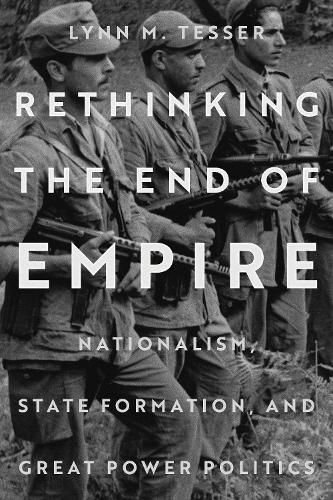Readings Newsletter
Become a Readings Member to make your shopping experience even easier.
Sign in or sign up for free!
You’re not far away from qualifying for FREE standard shipping within Australia
You’ve qualified for FREE standard shipping within Australia
The cart is loading…






Why did a nation-state order emerge when nationalist activism was typically an elitist pursuit in the age of empire? Ordinary inhabitants and even most indigenous elites tended to possess religious, ethnic, or status-based identities rather than national identities. Why then did the desires of a typically small number result in wave after wave of new states? The answer has customarily centered on 'nationalists' acting against weakening empires during a time of proliferating beliefs that peoples should control their destiny. Rethinking the End of Empire offers a wholly unique approach by arguing that nationalism often existed more in the perceptions of external observers than of local activists and insurgents, underscoring the need to treat nationalism relationally.
Drawing on research largely untapped by international relations scholars, Lynn M. Tesser analyzes the decades prior to clusters of state birth to show that the transformation of pre-independence mobilization into moves toward territorial separation lay more with the politics of empires than republican ideas. Featuring extensive insights from sociology, history, and area studies, this book adds nuance to scholarship that assumes most, if not all, pre-independence unrest was nationalist and separatist, and sheds light on why varied demands for change eventually coalesced around independence in some cases, but not others.
$9.00 standard shipping within Australia
FREE standard shipping within Australia for orders over $100.00
Express & International shipping calculated at checkout
Stock availability can be subject to change without notice. We recommend calling the shop or contacting our online team to check availability of low stock items. Please see our Shopping Online page for more details.
Why did a nation-state order emerge when nationalist activism was typically an elitist pursuit in the age of empire? Ordinary inhabitants and even most indigenous elites tended to possess religious, ethnic, or status-based identities rather than national identities. Why then did the desires of a typically small number result in wave after wave of new states? The answer has customarily centered on 'nationalists' acting against weakening empires during a time of proliferating beliefs that peoples should control their destiny. Rethinking the End of Empire offers a wholly unique approach by arguing that nationalism often existed more in the perceptions of external observers than of local activists and insurgents, underscoring the need to treat nationalism relationally.
Drawing on research largely untapped by international relations scholars, Lynn M. Tesser analyzes the decades prior to clusters of state birth to show that the transformation of pre-independence mobilization into moves toward territorial separation lay more with the politics of empires than republican ideas. Featuring extensive insights from sociology, history, and area studies, this book adds nuance to scholarship that assumes most, if not all, pre-independence unrest was nationalist and separatist, and sheds light on why varied demands for change eventually coalesced around independence in some cases, but not others.